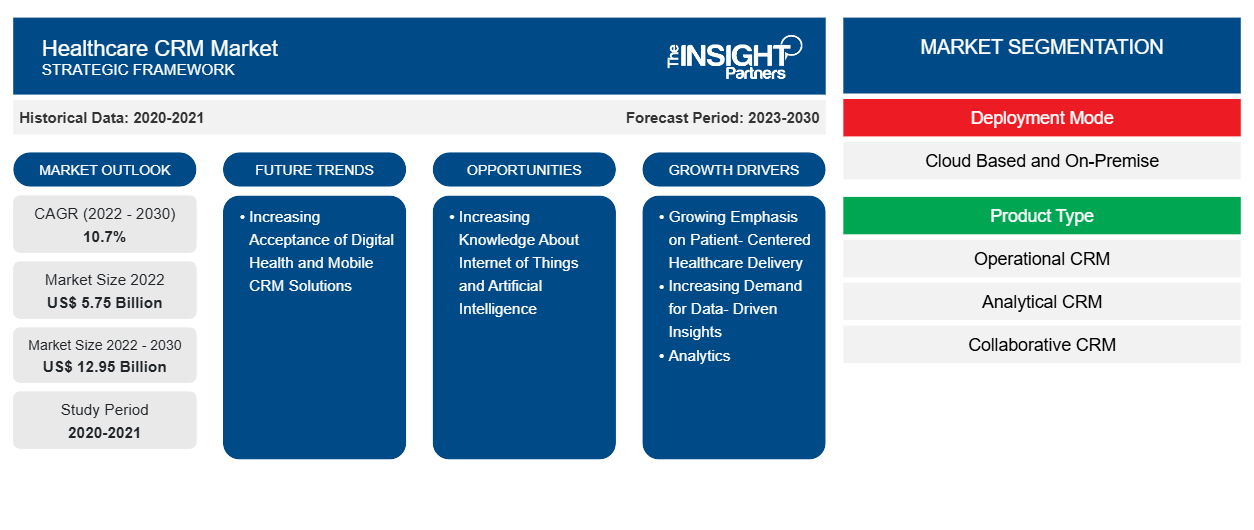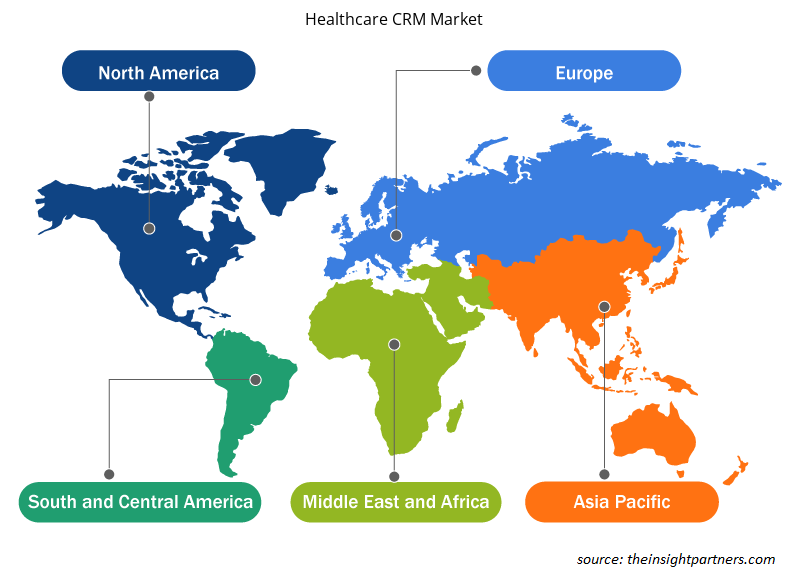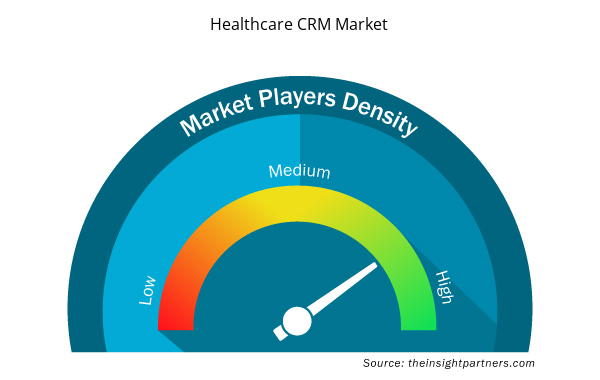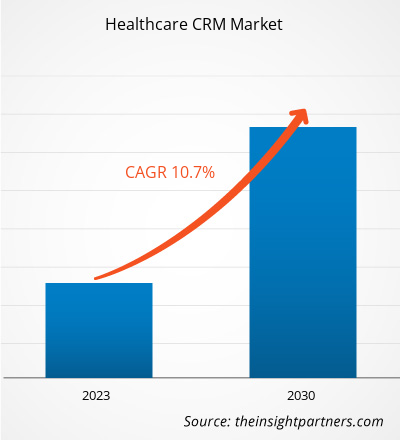[Research Report] The healthcare CRM market value is projected to grow from US$ 5,750.95 million in 2022 to US$ 12,947.15 million by 2030; with a CAGR of 10.7% from 2022 to 2030.
Market Insights and Analyst View:
Healthcare CRM is an industry-specific system that assists medical service providers in storing and managing patient information, improving service and engagement, improving patient acquisition strategy, and automating marketing and sales operations while adhering to healthcare security standards. Key factors driving the healthcare CRM market growth include the growing emphasis on patient-centered healthcare delivery and increasing demand for data-driven insights, analytics, and population health management. However, the lack of data security and concerns related to patient information privacy hinder the healthcare CRM market growth.
Growth Drivers and Restraints:
A patient-centric approach in healthcare systems can establish a partnership among patients, their families, and healthcare practitioners to align decisions in accordance with patients’ needs, preferences, and demands. It also includes the delivery of specific education and support to patients to make certain decisions and participate in their care.
Increased engagement with all stakeholders (providers, patients, and others) reduces overall expenses. Additionally, improved knowledge and understanding of health, well-being, and healthcare choices among patients lead to enhanced care and reduced levels of illness. This improved knowledge can facilitate care after discharge, hospital visits, reduced readmissions, and secondary consults. By engaging and collaborating with patients in decision-making, health providers can make more suitable decisions regarding a patient’s health. There is also an increased competitive advantage as more hospitals compete for patients based on both qualities of care and cost. Better quality of life for patients leads to an increase in the satisfaction of both doctor and patient.
Customize This Report To Suit Your Requirement
You will get customization on any report - free of charge - including parts of this report, or country-level analysis, Excel Data pack, as well as avail great offers and discounts for start-ups & universities
Healthcare CRM Market: Strategic Insights

- Get Top Key Market Trends of this report.This FREE sample will include data analysis, ranging from market trends to estimates and forecasts.
Customize This Report To Suit Your Requirement
You will get customization on any report - free of charge - including parts of this report, or country-level analysis, Excel Data pack, as well as avail great offers and discounts for start-ups & universities
Healthcare CRM Market: Strategic Insights

- Get Top Key Market Trends of this report.This FREE sample will include data analysis, ranging from market trends to estimates and forecasts.
Technological innovations and software development are crucial to the healthcare industry revolution. These technological developments support medical and administrative services that dramatically enhance and ease healthcare processes, communications, and workflow. Patient-centric healthcare boosts patient satisfaction levels, which benefits healthcare providers and practices. Thus, the rising adoption of a patient-centric approach by healthcare providers is driving the growth of the healthcare CRM market.
However, the protection of sensitive health data stored in CRM portals is a major concern among healthcare providers and care receivers. As the end users operating the CRM may sell personal data to third parties, patients are worried about the privacy of their private data, which may include their biological data. Additionally, if these devices are connected to the medical billing records of the patients, the risk might further entail a financial data breach. According to the HIPAA Journal, 5,150 healthcare data breaches of over 500 records have been reported between 2009 and 2022 to the HHS’ Office for Civil Rights. Those breaches have exposed or impermissibly disclosed 382,262,109 healthcare records. That equates to over 1.2x the population of the US. In 2022, an average of 1.94 data breaches of 500 or more healthcare records were reported daily. Despite technology companies investing increasingly high amounts to enhance the security of their offerings, consumers are likely to take some time to rely completely on software for their healthcare-related activities. Thus, issues related to data security and privacy are limiting the adoption of CRM software, thereby hindering market growth.
Trends:
The increasing trend of accepting digital health and mobile customer relationship management (CRM) solutions in the healthcare sector is reshaping the landscape of healthcare CRM, thereby driving the demand for innovative platforms that streamline patient engagement, virtual healthcare delivery, and mobile care coordination. Increasing acceptance of digital health further helps the healthcare industry leverage digital channels, mobile technology, and enhanced patient experiences to optimize care delivery and patient satisfaction.
The acceptance of digital health within healthcare infrastructure influences integrating care coordination tools, secure messaging platforms, and remote care coordination capabilities to support multi-channel care interactions, facilitate clinician-patient communication, and enhance patient engagement across diverse touchpoints. Additionally, rapid advancements in mobile technologies and applications, new opportunities for integrating mobile health into existing eHealth services, and ongoing expansion of mobile cellular network coverage are among the major factors supporting the proliferation of mobile healthcare solutions such as mobile CRM. As per the International Telecommunication Union (ITU) estimates, there are over 5 billion wireless subscribers, with over 70% living in low- and middle-income countries in 2020. According to the GSM Association, commercial wireless transmissions have reached ~85% of the world's population, i.e., far beyond the reach of the electric grid. The proliferation of wireless communication would help enhance the quality of care and patient health and save huge unnecessary healthcare costs every year by simply assisting in addressing issues such as remote patient monitoring and medical scheduling. The applications of mHealth are likely to expand in the coming years. According to Salesforce, ~52% of hospitals use three or more connected health technologies, including 58% with mobile-optimized patient portals. Thus, the increasing applications of mobile health solutions and increasing acceptance of digital health globally will increase the demand for healthcare CRM in various healthcare infrastructures.
Report Segmentation and Scope:
The global healthcare CRM market is segmented on the basis of deployment mode, product type, application, and end user. Based on deployment mode, the market is bifurcated into cloud based and on-premise. Based on product type, the market is divided into operational CRM, analytical CRM, and collaborative CRM. The healthcare CRM market, by application, is divided relationship management, case management, case coordination, community outreach, and others. In terms of end user, the healthcare CRM market is segmented into providers, payers, and others. Geographically, the healthcare CRM market is segmented into North America (the US, Canada, and Mexico), Europe (Germany, France, Italy, the UK, Russia, and the Rest of Europe), Asia Pacific (Australia, China, Japan, India, South Korea, and the Rest of Asia Pacific), Middle East & Africa (South Africa, Saudi Arabia, the UAE, and the Rest of Middle East & Africa), and South & Central America (Brazil, Argentina, and the Rest of South & Central America).
Segmental Analysis:
Based on deployment mode, the healthcare CRM market is segmented into cloud-based and on-premise. The cloud-based segment held a larger share of the market in 2022 and is expected to register a higher CAGR in the market from 2022 to 2030. Cloud-based healthcare CRM solutions are hosted on the vendor's servers and accessed through a web browser. Cloud-based CRM solutions offer unparalleled accessibility, allowing healthcare professionals to access patient data and CRM tools from any location with internet connectivity. This flexibility is particularly valuable for healthcare providers working remotely or across multiple locations.
The healthcare CRM market, by product type, is segmented into analytical CRM, collaborative CRM, and operational CRM. The operational CRM segment held the largest share of the market in 2022 and is anticipated to register the highest CAGR in the market during 2022–2030. Operational CRM focuses on streamlining and automating operational processes such as appointment scheduling, patient registration, billing, and claim processing within healthcare organizations. These solutions help healthcare providers improve efficiency, reduce administrative burden, and enhance the overall patient experience.
By application, the healthcare CRM market is segmented into case management, relationship management, community outreach, case coordination, and others. The relationship management segment held the largest share of the market in 2022 and is expected to register the highest CAGR in the market from 2022 to 2030. Relationship management in the healthcare CRM market focuses on building and maintaining strong relationships with patients, caregivers, and other stakeholders.
In terms of end user, the healthcare CRM market is segmented into providers, payers, and others. The providers segment held the largest share of the market in 2022 and is expected to register the highest CAGR in the market from 2022 to 2030. Providers, including hospitals, clinics, and individual healthcare professionals, require CRM solutions to help them manage patient cases, coordinate care, and build strong relationships with patients.
Regional Analysis:
Geographically, the healthcare CRM market is segmented into North America, Europe, Asia Pacific, South & Central America, and Middle East & Africa. In 2022, North America held the largest share of the global healthcare CRM market. Asia Pacific is estimated to register the highest CAGR during 2022–2030.
The majority of hospitals and clinics in the US are experiencing financial and operational stress. Healthcare CRM software is primarily associated with hospitals, clinics, and ambulatory surgical centers to schedule and manage appointments, especially in emergency departments, and inefficient scheduling in outpatient, in-patient, and surgical departments. Efficient patient scheduling management remains an urgent issue for most hospitals and clinics. Due to improper medical scheduling, patients experience delays in receiving quality care in public and private healthcare systems. The 2022 survey of Physician Appointment Wait Times and Medicare and Medicaid Acceptance Rates states that there is a waiting period of an average of 26 days to schedule a first-time appointment with a physician, an 8% increase since 2017 when the average wait time was ~24 days. This leads to prolonged wait times, scheduling difficulties, and an imbalance of supply and demand in the public and private healthcare sectors. Healthcare CRM software enables hospitals and clinics to track the arrival and departure of patients and gain real-time updates on co-pays and cancellations. The use of software reduces the no-shows by 30% with appointment reminder calls. It enhances the entire treatment procedure and improves communication with the patient.
Furthermore, the US reports a high prevalence of chronic and acute diseases. According to the “Heart Disease and Stroke Statistics - 2023 Update” by the American Heart Association, coronary heart disease (CHD) was a leading cause (41.2%) of deaths associated with CVDs in the US in 2020, followed by stroke (17.3%), other CVDs (16.8%), high blood pressure (12.9%), heart failure (9.2%), and diseases of the arteries (2.6%). As per the US Centers for Disease Control and Prevention (CDC), ~1 in 20 adults in the US aged 20 and above suffer from coronary artery disease. Thus, a high prevalence of CVDs and other chronic diseases propels the demand for medical scheduling and adoption of healthcare CRM in the US. Also, the rapid adoption of healthcare IT in the US is anticipated to drive the healthcare CRM market growth in the future.
Healthcare CRM Market Regional Insights
The regional trends and factors influencing the Healthcare CRM Market throughout the forecast period have been thoroughly explained by the analysts at Insight Partners. This section also discusses Healthcare CRM Market segments and geography across North America, Europe, Asia Pacific, Middle East and Africa, and South and Central America.

- Get the Regional Specific Data for Healthcare CRM Market
Healthcare CRM Market Report Scope
| Report Attribute | Details |
|---|---|
| Market size in 2022 | US$ 5.75 Billion |
| Market Size by 2030 | US$ 12.95 Billion |
| Global CAGR (2022 - 2030) | 10.7% |
| Historical Data | 2020-2021 |
| Forecast period | 2023-2030 |
| Segments Covered |
By Deployment Mode
|
| Regions and Countries Covered | North America
|
| Market leaders and key company profiles |
Healthcare CRM Market Players Density: Understanding Its Impact on Business Dynamics
The Healthcare CRM Market market is growing rapidly, driven by increasing end-user demand due to factors such as evolving consumer preferences, technological advancements, and greater awareness of the product's benefits. As demand rises, businesses are expanding their offerings, innovating to meet consumer needs, and capitalizing on emerging trends, which further fuels market growth.
Market players density refers to the distribution of firms or companies operating within a particular market or industry. It indicates how many competitors (market players) are present in a given market space relative to its size or total market value.
Major Companies operating in the Healthcare CRM Market are:
- Pegasystems Inc
- Sage Group Plc
- IQVIA Holdings Inc
- VerioMed Corp
- Pipedrive Inc
Disclaimer: The companies listed above are not ranked in any particular order.

- Get the Healthcare CRM Market top key players overview
Industry Developments and Future Opportunities:
Various initiatives by key players operating in the global healthcare CRM market are listed below:
- In August 2023, IBM and Salesforce announced a collaboration to help businesses worldwide across industries accelerate their adoption of AI for CRM. Together, the two companies support clients to revolutionize customer, partner, and employee experiences while helping safeguard their data.
- In April 2022, Cured announced the launch of the next evolution of its digital marketing and customer relationship management (CRM) platform built for healthcare, further enabling the company to deliver on its mission to bring care full circle. These platform advancements empower healthcare organizations to build unparalleled relationships with new customers and existing patients.
- In November 2021, Pegasystems Inc collaborated with Google Cloud, which improved experiences in healthcare with better data insights and personalization. This partnership between Pega and Google Cloud brought together the capabilities of Google Cloud’s Healthcare Data Engine and Pega’s suite of intelligent healthcare solutions.
Competitive Landscape and Key Companies:
Pegasystems Inc, Sage Group Plc, IQVIA Holdings Inc, VerioMed Corp, Pipedrive Inc, WebMD Ignite Inc, Zendesk Inc, SugarCRM Inc, SAP SE, Veeva Systems Inc, Oracle Corp, ScienceSoft USA Corp, Microsoft Corp, Salesforce Inc, and International Business Machines Corp are among the prominent players operating in the healthcare CRM market. These companies focus on new technologies, advancements in existing products, and geographic expansions to meet the growing consumer demand worldwide and increase their product range in specialty portfolios.
- Historical Analysis (2 Years), Base Year, Forecast (7 Years) with CAGR
- PEST and SWOT Analysis
- Market Size Value / Volume - Global, Regional, Country
- Industry and Competitive Landscape
- Excel Dataset



Report Coverage
Revenue forecast, Company Analysis, Industry landscape, Growth factors, and Trends

Segment Covered
Deployment Mode, Product Type, Application, End User, and Geography

Regional Scope
North America, Europe, Asia Pacific, Middle East & Africa, South & Central America

Country Scope
This text is related
to country scope.
Frequently Asked Questions
The healthcare CRM market majorly consists of the players, including Pegasystems Inc, Sage Group Plc, IQVIA Holdings Inc, VerioMed Corp, Pipedrive Inc, WebMD Ignite Inc, Zendesk Inc, SugarCRM Inc, SAP SE, Veeva Systems Inc, Oracle Corp, ScienceSoft USA Corp, Microsoft Corp, Salesforce Inc, and International Business Machines Corp.
Healthcare CRM is an industry-specific system that assists medical service providers in storing and managing patient information, improving service and engagement, improving patient acquisition strategy, and automating marketing and sales operations all while adhering to healthcare security standards.
The healthcare CRM market is expected to be valued at US$ 12,947.15 million in 2030.
The healthcare CRM market was valued at US$ 5,750.95 million in 2022.
Factors such as growing emphasis on patient-centered healthcare delivery and increasing demand for data-driven insights, analytics, and population health management propel market growth.
Based on the deployment mode, the healthcare CRM market is segmented into cloud-based and on-premise. The cloud based segment held the largest share of the market in 2022 and the same segment is expected to register the highest CAGR in the market from 2022 to 2030.
The healthcare CRM market, by product type, is segmented into analytical CRM, collaborative CRM, and operational CRM. The operational CRM segment held the largest share of the market in 2022, and it is anticipated to register the highest CAGR in the market during 2022–2030.
Based on the end user, the healthcare CRM market is segmented into providers, payers, and others. The providers segment held the largest share of the market in 2022 and the same segment is expected to register the highest CAGR in the market from 2022 to 2030.
Based on the application, the healthcare CRM market is segmented into case management, relationship management, community outreach, case coordination, and others. The relationship management segment held the largest share of the market in 2022 and the same segment is expected to register the highest CAGR in the market from 2022 to 2030.
Trends and growth analysis reports related to Technology, Media and Telecommunications : READ MORE..
The List of Companies - Healthcare CRM Market
- Pegasystems Inc
- Sage Group Plc
- IQVIA Holdings Inc
- VerioMed Corp
- Pipedrive Inc
- WebMD Ignite Inc
- Zendesk Inc
- SugarCRM Inc
- SAP SE
- Veeva Systems Inc
- Oracle Corp
- ScienceSoft USA Corp
- Microsoft Corp
- Salesforce Inc
- International Business Machines Corp

 Get Free Sample For
Get Free Sample For